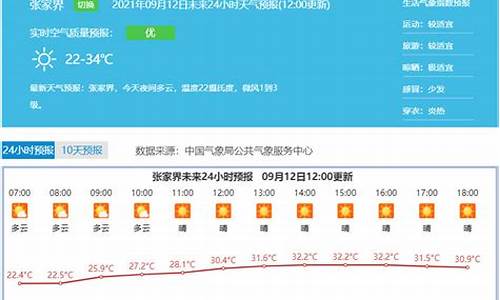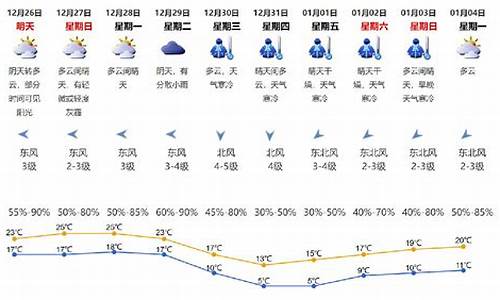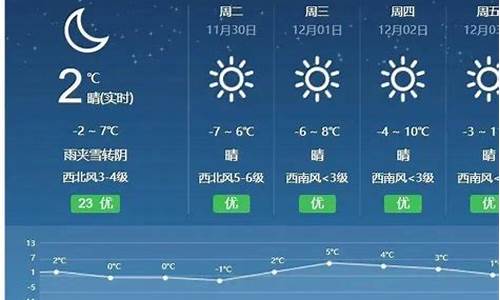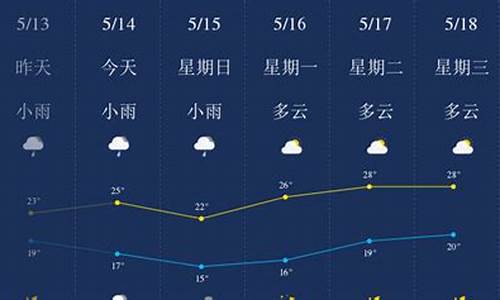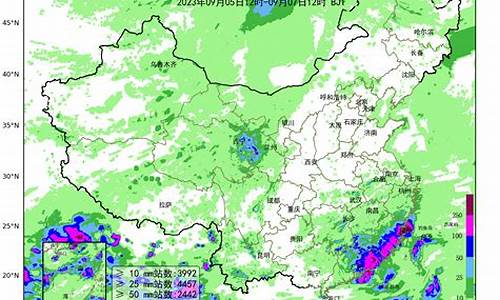英国人关于天气的对话_英国人谈天气英语
1.关于谈论天气的英语对话
2.向别人询问天气时应该用英语怎么说
3.急需英语两人谈论天气的对话
4.英语翻译不要机器翻译,
5.新概念英语第2册Lesson25~27课文详注
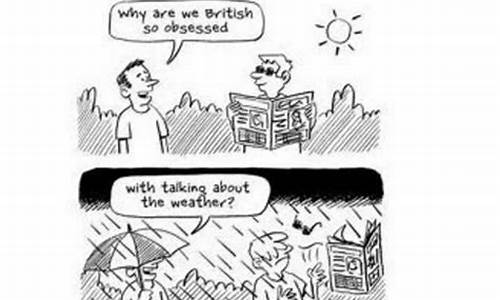
It shows that it will be sunny in most part of China for each day in the next five days.This is calculated based on different types of weather.so if a day is forecast to be sunny. we will see a sunny or partly cloudy symbol rather than a rain cloud. The wind speed and direction are the expected conditions at midday.But in southern part of China will have light rain,The temperature will be 15 to 8 centigrade. We hope people can take umbrella with when you go out.In northern part the temperature will get down,so pay attention to your cloth.
天气预报显示在未来五天内,中国大部分地区都会是晴天.这是由几种不同的天气类型推算的, 我们将看到大部分的晴天和局部阴天而不是阴雨天气.而风速和风向是由正午的天气情况决定的,但是在中国南方地区会有小雨,气温在15-8摄式度. 我们希望大家出门时要带伞.而在中国北部的气温会下降,所以应及时添减衣物
关于谈论天气的英语对话
最常见的句型:What's the weather like ./How's the weather ?译句:天气怎么样?
一般答语为:It's sunny / cloudy / windy / rainy.译句:今天是晴天/多云/刮风/下雨 。WSI
Is it cold / hot ? 译句:天气冷 / 热吗?
用来询问天气的一般疑问句。例如问:A:Is it hot in summer there ? 那里天气热吗?答:B:Yes ,is it .译句:是的,很热。
3.What a cold /hot ?day today !译句:今天多冷/多热 !
扩展资料1、little bitty stinging rain绵绵细雨
bitty口语词,微小的,少量的 a little bitty housse一个极小的房子
2、big old fat rain 瓢泼大雨, 又大又肥的雨
3、rain that flow in side ways 横扫的暴雨,方向不定的大雨
4、how is the weather tomorrow?明天的天气怎么样呢?
=what is the weather like tomorrow?
5、what does the weather report say? 天气预报是怎么说的呢?
=what is the weather report for tomorrow?
6、what is the wind speed today? 今天的风速怎么样呢?
temperature温度、humidity湿度
7、it's fine today。今天是个好天气。
=it's a lovely day.
向别人询问天气时应该用英语怎么说
Part 1
A: It looks like it's going to be sunny.
今天看来像是个晴天。
B: Yes, it's much better than yesterday.
是的,比昨天好多了。
A: They say we're going to get some rain later.
据说待会儿要下雨。
B: Oh, let's just hope it stays[维持某种状态]warm.
哦,我只希望一直暖和下去。
PART 2
A: I think it's going to be a nice day.
我想今天会是一个好天。
B: It's certainly a big improvement over yesterday.
肯定比昨天大有好转。
A: But it's supposed to get cloudy and windy again this afternoon.
但是,据说今天下午又要转阴刮风了。
B: Well, the worst of the winter should be over.
不过,冬天最糟糕的一段日子总该过去了。
Part 3
A: It seems to be clearing up.
看来天要放晴了。
B: It's such a nice change.
真实令人高兴的转变。
A: I really don't think this weather will last.
我确实认为这样的好天长不了。
B: Let's just hope it doesn't get cold again.
但愿不会再冷。
PART 4
A: Beautiful day, isn't it?
今天天气真好,是不是?
B: Yes, it's not like what the radio said at all.
是的,一点也不像收音机里说的那样。
A: I wish it would stay this way for the weekend.
但愿整个周末都能保持这样的好天气。
B: As long as it doesn't snow!
只要不下雪就行啊!
急需英语两人谈论天气的对话
英语中问天气的句子有:?
1、How is the weather? 天气怎么样?
2、What's the weather like today? 今天天气怎么样?
weather 读法 英?['we?]?美?['w]?
1、n. 天气;气象;气候;处境
2、vt. 经受住;使风化;侵蚀;使受风吹雨打
3、vi. 风化;受侵蚀;经受风雨
4、adj. 露天的;迎风的
短语:
1、warm weather?温暖的天气;温暖的气候
2、weather report?天气预报,天气报告;气象报告
3、weather resistance?耐气候性;耐风化性
4、severe weather?恶劣天气;风雨交加的天气;剧烈天气
5、weather station?气象站
扩展资料一、weather的词义辨析:
weather, climate的区别:
1、weather的意思是:一天内具体的天气状况
2、climate的意思是:长期的气候状况,例如:
The climate here is not good for you.
二、weather的近义词:climate?
climate 读法 英?[?kla?m?t]?美?[?kla?m?t]?
n. 气候;风气;思潮;风土
短语:
1、mild climate?温和的气候
2、dry climate?干燥气候
3、continental climate?大陆性气候
4、climate control?气候控制
5、temperate climate?温带气候
英语翻译不要机器翻译,
Paddy: Very bizarre(=weird) weather we’re having isn’t it?
帕迪:这天气真是奇怪,不是吗?
Jim: It’s like four seasons in one day!
吉姆:这真像在一天中经历了四季。
Paddy: Thunderstorms one minute, sunshine the next, then it’s freezing cold. That’s not right in March!
帕迪:一会儿是雷雨阵阵,一会儿又是阳光灿烂,之后又是冰冻。在三月,这种天气可不太对劲啊!
Jim: It’s really humid(adj.潮湿的) today isn’t it?
吉姆:今天真的很潮湿,不是吗?
Paddy: I think it has something to do with climate change.
帕迪:我想这和气候的变化有点关系。
Jim: What do you mean?
吉姆:你的意思是?
Paddy: Hotter summers, colder winters. Weather is going to extremes all over the world.
帕迪:越来越热的夏天,越来越冷的冬天。全球气温都越发极端了。
Jim: You might be right there. Governments need to stop thinking about endless economic growth. We only have one world!
吉姆:这点说得有些道理。政府机构们不应该只关心无止境的经济增长!我们只有一个地球。 Dialogue 1: 1对话:George: What’s the weather like in Beijing? George: 北京的天气怎样? Yong Mei: Well in the winter it's really cold and in the summer it's really hot. Yong Mei: 冬天特冷,夏天特热。 George: And what's the weather like there at the moment? George: 眼下天起如何呢? Yong Mei: I think it’s still quite warm, but a bit rainy too. John: 眼下还挺暖和的,不过有点阴雨天。 Dialogue 2: 2对话:Chen: What’s the weather forecast for the weekend? Chen: 周末的天气预报如何? Sam: It’s going to be cold tonight and freezing on Saturday. Sam: 今天夜里很寒冷,星期六将有霜冻。 Chen: What about on Sunday? Chen: 星期日怎么样? Sam: It’s getting worse; it’s going to be windy and maybe even snowy. </SPAN>
新概念英语第2册Lesson25~27课文详注
在英国,谈论天气是永恒的话题。事实上英国人对天气谈论太多了。通常两个人相遇的时候,他们可能做的第一件事就是谈论天气。他们会这样开始话题:“真是好天气啊!不是吗?”或者类似这样的开场白。英国人喜欢谈论天气的原因可能有以下两点:一是天气的不确定性,这在前文已经提到过;二是谈论天气要比谈论政治要来得友好一些。这不会伤害别人,虽然有时候他们也会激烈地争论天气将会怎样变化。
新概念英语第2册Lesson25课文详注
1.Do the English speak English? (标题)英国人讲的是英语吗?
English在这里均为名词,但意义不同。第1个指“英国人”,为总称,后面的动词必须用复数;第2个指“英语”。指语言时前面不加冠词,指人则要加the:
The English often talk about the weather.
英国人经常谈论天气。
Do you speak English?
你会讲英语吗?
English还可以作形容词,表示“英格兰的”、“英国的”、“英国人的”等:
He was English.
他是个英国人。
与English相似的单词有French,Chinese,Japanese等:
I said good morning to him in French.
我用法语向他问早上好。
2.I arrived in London at last. 我终于到了伦敦。
(1)这里London前面不加冠词,介词in暗指London是个大地方。
(2)at last为固定短语,表示“终于”,一般暗指经过一番等待、麻烦(苦恼)或努力之后:
It was my turn at last.
终于轮到我了。
I repeated my question several times and at last he understood.
我把问话重复了很多遍。他终于听懂了。
3.I did not know the way to my hotel…我不知道去饭店的路该怎么走……
my hotel不是指属于我的饭店(或旅馆),而是指我已订了房间或者要去住的饭店。
4.I not only spoke English very carefully, but very clearly as well.
我的英语讲得不但非常认真,而且咬字也非常清楚。
not only…but…as well这组连接词与 not only…but also是同样的意思,都表示“不但……而且……”,not only与 but后面的成分必须对等。课文中的这句话可以改为:
I spoke English not only very carefully, but very clearly as well.(意义不变)
Mary not only found her aunt, but stayed with her for two weeks as well.
玛丽不仅找到了她姑妈,而且还在她那里住了两星期。
(连接整个谓语)
as well这个短语本身的含义是“也”、“又”、“还”:
If you go home tomorrow, I'll go as well.
如果你明天回家,我也回。
He lent me his pen, and his dictionary as well.
他把钢笔借给了我,还有字典。
5.… he spoke neither slowly nor clearly.……他讲得既不慢也不清楚。
否定连词 neither…nor…(既不……也不……)连接的成分必须对等:
Neither the boss nor his secretary is flying to New York.
老板和他的秘书都没有飞往纽约。(连接两个主语)
I met neither Jane nor her husband.
简和她的丈夫我都没见到。(连接两个宾语)
6.My teacher never spoke English like that! 我的老师从来不那样讲英语!
like 在这里是介词,表示“像”、“像……一样”:
There's no one like you.
没有人像你一样。
He speaks like a foreigner.
他说话像外国人。
新概念英语第2册Lesson26课文详注
1.They always tell you what a picture is‘about’.(他们)总是告诉你一张画的“意思”是什么。
This is a book about Australia.
这是一本关于澳大利亚的书。
They are talking about modern art.
他们在谈论现代艺术。
课文中这句话可以直译为:他们总是告诉你某一幅画是“关于”什么的,也就是一幅画的“意思”是什么。about放在引号里,一是指这些人谈论画的时候经常用到这个词,二是表示一种讽刺,因为有些画没有任何“意思”。
2.They are just pretty patterns.它们就是些好看的图案。
just在此处指“只是”、“仅仅(是)”,而不是指“刚才”、“正好”、“正是:
It was just a wrong number.
这只是一个错误的号码。(即只不过是拨错了号码)
It's just six o'clock.
正好6点。
I've just heard the news.
我刚刚听到这个消息。
3.We like them in the same way that we like pretty curtain material. 我们喜爱它们就像我们喜爱漂亮的窗帘布一样。
in the same way that/as是个连接短语,用于表示比较,可译为“像/和……一样”:
She walks in the same way that/as her sister did.
她的走路姿势和她姐姐以前走路的姿势一模一样。
4.I think that young children often appreciate modern pictures better than anyone else. 我觉得小孩子们往往比任何人都更能欣赏现代绘画。
else经常与不定代词连用(如everyone else,someone else,anything else等),表示“另外/加”、“其它/他的”或“不同的”:
Can you find anyone else?
你还可以找到其他人吗?
I can find nothing else here except an old dictionary.
除了一本旧字典,我在这儿再也找不到别的东西了。
课文中的这句话表示小孩子们比其他任何人都更能欣赏现代绘画。
5.…she always tells me whether my pictures are good or not.
……她总能说出我的画是好还是坏。
连接词 whether…or not可以表示选择:
I don't know whether you are interested (in it) or not.
我不知道你(对它)是否感兴趣。
You must help him, whether you like him or not.
不管你是否喜欢他,你(都)必须帮助他。
6.She looked at it critically for a moment. 她用挑剔的目光看了一会儿。
for a moment为固定短语,表示“片刻”、“一会儿”:
They looked at each other for a moment.
他们互相对视了一会儿。
7.It's all right. 还可以吧。
all right为固定短语,在这里表示“令人满意的”、“不错的”:
The performance of the Greenwood Boys at the Workers' Club was all right.
“绿林少年”演唱团在工人俱乐部的那场演出还不错。
all right还可以表达许多其他意思,如表示同意等。
新概念英语第2册Lesson27课文详注
1.…the boys put up their tent in the middle of a field.……孩子们在田野中央搭起了帐篷。
in the middle of表示“在……当中”、“在……中间”,既可以用于表示地理位置,又可以用于表示时间或在某个过程当中:
He heard someone shouting in the middle of the night.
午夜前后,他听到有人大声叫喊。
Mary was in the middle of reading when her aunt arrived.
玛丽的姑妈到达时,玛丽正在读书。
in the centre of(在……中部/中央)则一般用于表示地理位置:
Alice Spring is a small town in the centre of Australia.
艾利斯斯普林斯是澳大利亚中部的一个小镇。
2.…they cooked a meal over an open fire.……他们就在篝火上烧起了饭。
open fire指无遮盖的、没有围起来的火,如篝火、盆火等。
3.…they told stories and sang songs by the campfire.……(他们)就围在营火旁讲起了故事,唱起了歌。介词by表示“在……旁边”、“靠近”,通常指距离非常近:Come and sit by me.
过来靠我坐。
There are many trees by the river.
河边有许多树。
4.But some time later it began to rain.但过了一阵子,天下起雨来。
副词 later表示“后来”、“以后”、“过后”:
He told me he would come again later (on).
他告诉我他以后会再来的。
I met her again a few days later.
几天以后我又遇见了她。
5.The stream wound its way across the field and then flowed right under their tent! 那小溪弯弯曲曲穿过田野,然后正好从他们的帐篷底下流过去!
(1)wind表示“曲折而行”时,既可以是及物动词,又可以是不及物动词:
The car wound through the village.
汽车曲曲折折地穿过村子。
The river winds its way through this district.
这条河弯弯曲曲地流经这个地区。
(2)right在此处表示强调,意为“正好”、“恰恰”、“就”。这种用法多见于口语中:
I met him right here.
我就是在这里见到他的。
He hit the man right on the nose.
他正好打中那人的鼻子。
声明:本站所有文章资源内容,如无特殊说明或标注,均为采集网络资源。如若本站内容侵犯了原著者的合法权益,可联系本站删除。

